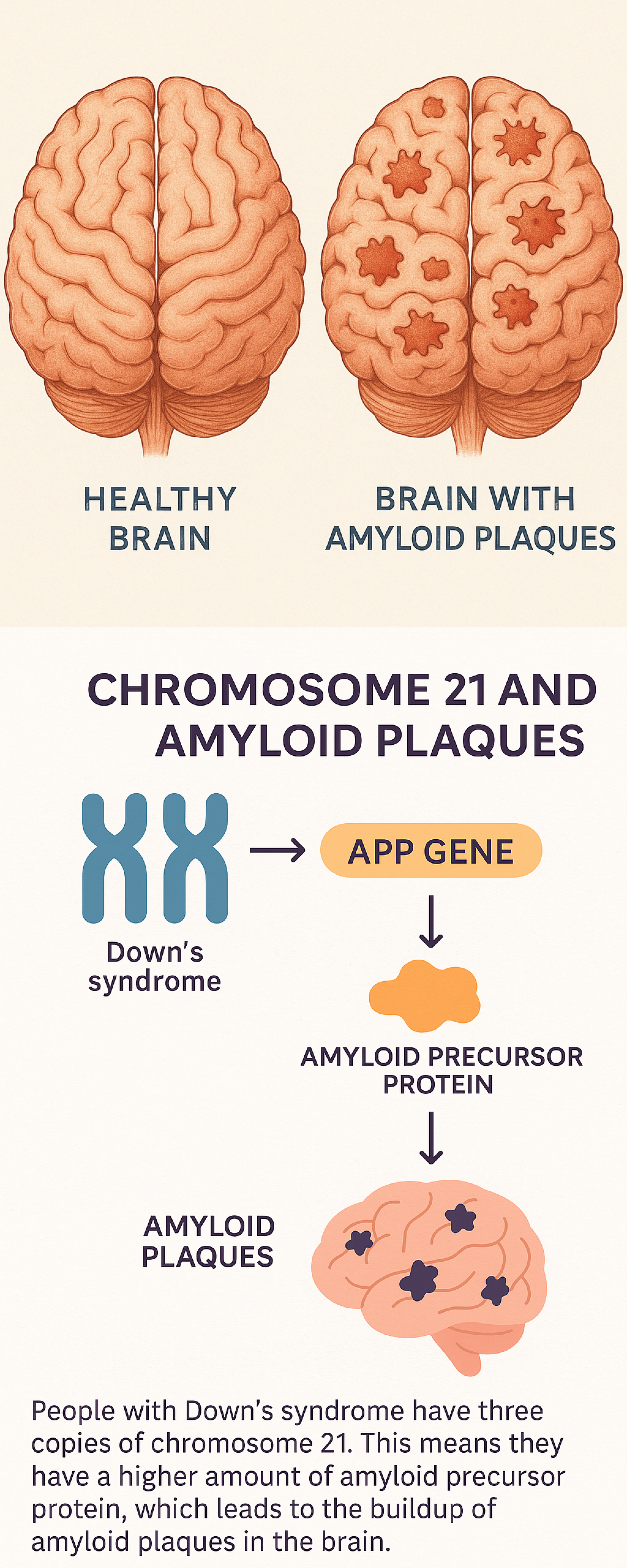Dementia and Down’s Syndrome
Dementia is a significant health concern for people with Down’s syndrome. While it is true that individuals with Down’s syndrome are at a higher risk of developing Alzheimer’s disease, this does not mean dementia is inevitable—and there is much we can do to support healthier, longer, and more fulfilling lives.
This article explores the link between Down’s syndrome and dementia and shares positive, practical lifestyle strategies that families, support workers, and professionals can use to reduce risk and improve wellbeing.
Understanding the Link
People with Down’s syndrome have a higher genetic risk of Alzheimer’s disease because of an extra copy of chromosome 21, which carries the amyloid precursor protein gene—a key player in the development of Alzheimer’s.
By the age of 40, many individuals with Down’s syndrome show changes in the brain similar to those seen in Alzheimer’s.
However, not everyone with these changes develops clinical dementia. Lifestyle, health, and quality of support make a big difference.
Early Signs to Be Aware Of
Recognising dementia in people with Down’s syndrome can be challenging because changes may be mistaken for other issues such as depression, sensory loss, or life transitions. Common early signs include:
A noticeable change in personality or mood
Increased forgetfulness or confusion
Losing interest in activities they used to enjoy
Changes in speech, mobility, or sleep patterns
Timely recognition allows for better care and support planning.
The Role of Chromosome 21 and Amyloid Plaques in Down’s Syndrome
What Are Amyloid Plaques?
Amyloid plaques are clumps of a protein called beta-amyloid that build up between nerve cells in the brain. These plaques are a hallmark of Alzheimer’s disease, one of the most common forms of dementia. Over time, they interfere with brain cell communication, trigger inflammation, and contribute to the death of neurons.
Why Is Chromosome 21 Involved?
People with Down’s syndrome have three copies of chromosome 21 instead of the usual two. This condition is known as trisomy 21.
Chromosome 21 carries the APP gene (Amyloid Precursor Protein gene).
The APP gene is responsible for producing amyloid precursor protein, which, when broken down, creates beta-amyloid.
Having an extra copy of the APP gene means the body produces more beta-amyloid protein than normal.
This overproduction increases the likelihood of amyloid plaque buildup in the brain—often starting in a person’s 30s or 40s.
What Does This Mean for Dementia Risk?
Studies show that by age 40, nearly all people with Down’s syndrome have some level of amyloid plaque in their brains, whether or not they show symptoms of dementia.
Many—but not all—go on to develop Alzheimer’s-type dementia, usually earlier than in the general population.

While dementia is more common in people with Down’s syndrome, there is so much we can do to improve outcomes, reduce risk, and support people to live well. Through early awareness, compassionate care, and a healthy lifestyle, we can help individuals thrive—with dignity, joy, and meaning.
Positive Lifestyle Suggestions to Reduce Risk
There’s growing evidence that the same healthy habits that benefit all of us can also help delay or reduce the risk of dementia in people with Down’s syndrome.
1. Prioritise a Brain-Healthy Diet
A balanced diet rich in:
Leafy greens, berries, and whole grains
Oily fish like salmon for brain-boosting omega-3
Limited sugars and processed foods
Consider the MIND diet (a hybrid of the Mediterranean and DASH diets), which is shown to reduce dementia risk.
2. Encourage Physical Activity
Regular movement supports heart and brain health. Aim for:
30 minutes daily of walking, swimming, or dancing
Activities that build balance and coordination
Tailor activities to the person’s interests and abilities to keep it fun and consistent.
3. Keep the Mind Active
Stimulate thinking and memory with:
Puzzles, memory games, or apps designed for cognitive health
Reading together, storytelling, music and singing
New learning experiences—like cooking a recipe or trying a craft
4. Support Social Connections
Loneliness and isolation are risk factors. Help the person:
Maintain friendships
Join social groups or day activities
Stay connected to family and community life
Even short, positive interactions can make a big difference.
5. Promote Good Sleep
Poor sleep can affect memory and thinking. Help establish:
A consistent bedtime routine
A calm, screen-free environment before bed
Medical support for sleep apnoea, which is more common in Down’s syndrome
6. Regular Health Checks
Stay on top of:
Vision and hearing tests (loss can mimic or worsen dementia)
Thyroid function, heart health, and other common medical issues
Medication reviews—some drugs can affect cognition

Further Reading and Research Links
Medical and Clinical Research
Down's Syndrome and Alzheimer's Disease – Alzheimer's Society UK
Overview of the connection between Down's syndrome and Alzheimer's, including early signs and support options.
🔗 https://www.alzheimers.org.uk/about-dementia/types-dementia/dementia-people-downs-syndromeDementia in Adults with Down’s Syndrome – NHS England Toolkit
A practical toolkit aimed at clinicians and carers for the assessment and management of dementia in people with Down’s syndrome.
🔗 https://www.england.nhs.uk/publication/dementia-and-people-with-learning-disabilities-toolkit/Down Syndrome and Alzheimer’s Disease – National Institute on Aging (US)
In-depth exploration of the biology and ongoing research, especially in relation to early onset.
🔗 https://www.nia.nih.gov/health/alzheimers-disease-people-down-syndromeBritish Journal of Learning Disabilities – Wiley Online Library
Peer-reviewed research on Down’s syndrome, cognitive decline, and care strategies.
🔗 https://onlinelibrary.wiley.com/journal/14683156
(Search “dementia Down’s syndrome” for targeted articles)
Support & Lifestyle Guidance
Down’s Syndrome Association – Ageing and Dementia
Accessible advice for families and carers, including symptom checklists and support planning.
🔗 https://www.downs-syndrome.org.uk/for-families-and-carers/ageing-and-dementia/University of Stirling – Dementia Friendly Environments for People with Learning Disabilities
Practical insights into adapting spaces and routines.
🔗 https://www.stir.ac.uk/research/hub/project/1557302Mencap – Supporting Older People with a Learning Disability
Includes general ageing guidance and dementia-specific advice for support staff.
🔗 https://www.mencap.org.uk/advice-and-support/older-people
Lifestyle & Prevention
NHS – Dementia Prevention: Lifestyle Advice
Practical guidance relevant to the general population, also applicable to people with Down’s syndrome.
🔗 https://www.nhs.uk/conditions/dementia/prevention/Alzheimer’s Research UK – Risk Reduction and Healthy Habits
Explains the lifestyle links and offers toolkits and videos.
🔗 https://www.alzheimersresearchuk.org/brain-health/reduce-your-risk/MindMate App – Cognitive Health Tools
A digital tool recommended by some professionals for tracking memory, mood, and daily activities.
🔗 https://www.mindmate-app.com/

